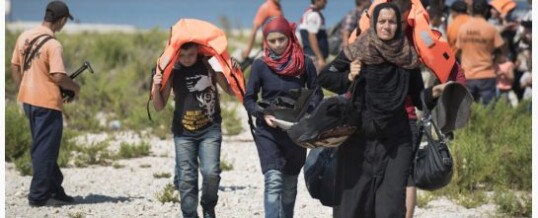
McLeod Group Blog, Nov. 23, 2015
Amid the excitement of a new government and the encouraging news of meaningful Canadian action to help in the global effort to assist refugees from the Middle East find asylum, there is cause for concern. Where will the money come from?
Canada’s spending on foreign aid has been dropping for the last five years. Under the international rules for calculating this assistance, the money Canada spends on supporting refugees during their first year here is counted as foreign aid. Canada has always claimed this as part of its aid, though many observers believe this is not legitimate, as the money is spent here, rather than assisting poor people in developing countries.
In 2013-14 Canada reported almost $210 million spent on refugees for their first year of residence here, of which about half was spent by the provinces. Meeting the needs of refugees in countries of asylum involves paying for housing, education, health care and other social services, plus support to facilitate integration into the life of the host country—including language training—and assistance with finding employment. According to a leaked government report, resettling 25,000 Syrian refugees in Canada will cost over $875 million by the end of March.
This expenditure is separate from the financial support Canada gives to the UN High Commissioner for Refugees (UNHCR) program—almost $80 million in 2014—to assist people who have had to flee their home countries but who have found only temporary haven. Currently UNHCR is assisting over four million refugees in the Middle East, most living in camps in Jordan, Lebanon and Turkey. Life in the camps is miserable, living in tents and subsisting on half-rations. The number of refugees in the Middle East continues to rise daily, despite the large numbers who have reached countries of asylum in Europe.
Several European countries have talked about taking some or most of the additional cost of hosting refugees from their foreign aid budgets. It is difficult if not impossible to justify this budgetary shift, as it amounts to taking money away from the world’s poorest and most vulnerable people. Even extra funds for this purpose will make it look as though the rich countries have increased their foreign aid, but in reality the money will never leave donor countries. Meanwhile, development cooperation projects will be cut back, or stopped altogether, and the progress in reducing poverty—a major cause of the instability which drives a lot of refugees—will be put in jeopardy. In the case of Canada, counting the cost of bringing refugees here will make our aid statistics look better, but it will reduce the pressure for real aid budget increases.
The Canadian government must resist the temptation to raid the foreign aid budget to pay for its commendable undertaking to resettle large numbers of refugees here. Cutting the budget for programs aimed at helping the poorest populations in the world in favour of short-term assistance for refugees entering Canada would be wrong. It is in Canada’s self interest, properly understood, to renew and rebuild its commitment to international development cooperation through robust and effective aid. Canada and Canadians also have a moral obligation to provide asylum to refugees from the violence and tragedy in the Middle East, and elsewhere in the world. Any other course of action would be inconsistent with our values.
